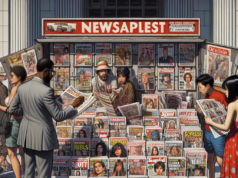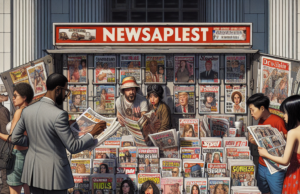
In an era where information is disseminated at lightning speed, gossip columns have emerged as a significant force in shaping public perception and celebrity culture. These columns, often filled with sensational stories and speculative narratives, play a crucial role in the modern media landscape. However, beneath the glitzy surface lies a complex web of historical, psychological, and ethical considerations that warrant deeper examination. This article aims to unveil the secrets behind the buzz of gossip columns, exploring their origins, impact, and future in an ever-evolving digital world.
Understanding the Role of Gossip Columns in Modern Media Landscapes
Gossip columns have become a staple of contemporary media, serving as both entertainment and a reflection of societal values. These columns provide readers with an inside look into the lives of celebrities, often blurring the lines between fact and fiction. In a world where public figures are scrutinized under a magnifying glass, gossip columns fulfill a dual purpose: they satisfy the public’s insatiable curiosity while also driving engagement for media outlets. The proliferation of social media has further amplified this phenomenon, allowing gossip to spread rapidly and reach a global audience. As a result, gossip columns have evolved from mere print publications to dynamic online platforms, adapting to the changing tastes and preferences of readers.
The Origins of Gossip: A Historical Perspective on Celebrity Culture
The roots of gossip can be traced back to ancient civilizations, where public figures were often the subjects of rumor and speculation. In the Roman Empire, for example, gossip served as a form of social commentary, reflecting the values and concerns of the populace. The modern concept of celebrity culture began to take shape in the 19th century with the rise of mass media, particularly newspapers and magazines. This era saw the emergence of gossip columns as a distinct genre, providing a platform for the public to engage with the lives of the rich and famous. Over time, gossip evolved from mere entertainment to a powerful tool that shapes public perception, influencing everything from political opinions to consumer behavior.
Analyzing the Psychological Impact of Gossip on Public Perception
Gossip has a profound psychological impact on both individuals and society as a whole. Research indicates that gossip can serve as a social bonding mechanism, fostering a sense of community among those who share information. However, it can also lead to negative consequences, such as the perpetuation of stereotypes and the reinforcement of social hierarchies. The portrayal of celebrities in gossip columns often influences public perception, shaping how individuals view not only the subjects of the gossip but also broader societal norms. This duality highlights the power of gossip to both unite and divide, making it a potent force in the realm of public opinion.
The Mechanics of Gossip: How Rumors Spread in the Digital Age
In the digital age, the mechanics of gossip have transformed dramatically. The advent of social media platforms has created an environment where rumors can spread like wildfire, often without verification or accountability. Algorithms designed to maximize engagement can amplify sensational stories, leading to a cycle of misinformation that is difficult to contain. Furthermore, the rise of citizen journalism has blurred the lines between traditional reporting and gossip, as individuals share their own narratives and observations online. This democratization of information has both positive and negative implications, as it allows for diverse voices to be heard while also increasing the risk of false information proliferating.
Ethical Considerations: The Fine Line Between News and Invasion of Privacy
The ethical implications of gossip columns are a topic of ongoing debate. While some argue that gossip serves a vital role in holding public figures accountable, others contend that it often crosses the line into invasion of privacy. The sensationalism inherent in many gossip columns can lead to the spread of harmful narratives that impact the lives of individuals and their families. As media outlets grapple with the balance between public interest and ethical responsibility, the question remains: where should the line be drawn? This dilemma is further complicated by the rapid pace of the digital landscape, where the demand for content often overshadows ethical considerations.
The Future of Gossip Columns: Trends and Predictions for the Industry
Looking ahead, the future of gossip columns is likely to be shaped by several key trends. As audiences become increasingly discerning, there is a growing demand for transparency and accountability in reporting. This shift may lead to a rise in ethical journalism practices within the gossip industry, as consumers seek out reliable sources of information. Additionally, the integration of technology, such as artificial intelligence and data analytics, may revolutionize how gossip is generated and consumed. As the landscape continues to evolve, it is essential for gossip columns to adapt to the changing expectations of their audience while remaining mindful of the ethical implications of their content.
In conclusion, gossip columns occupy a unique space within the modern media landscape, serving as both a reflection of societal values and a powerful influence on public perception. Understanding the historical context, psychological impact, and ethical considerations surrounding gossip is crucial for navigating this complex terrain. As the industry continues to evolve, it is imperative for both media creators and consumers to engage critically with gossip, recognizing its potential to inform, entertain, and, at times, mislead. The secrets behind gossip column buzz are not merely about the stories themselves, but the broader implications they hold for society as a whole.


























